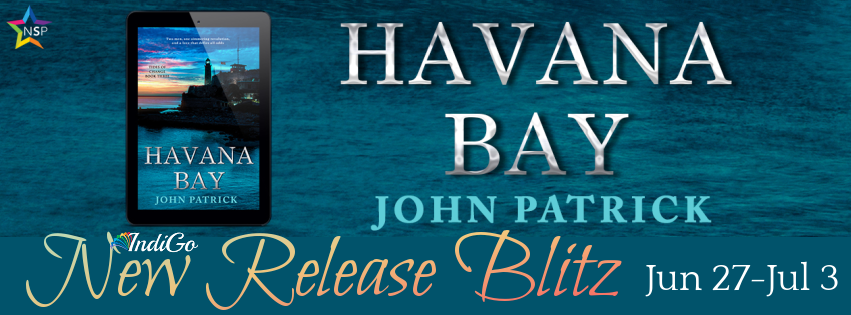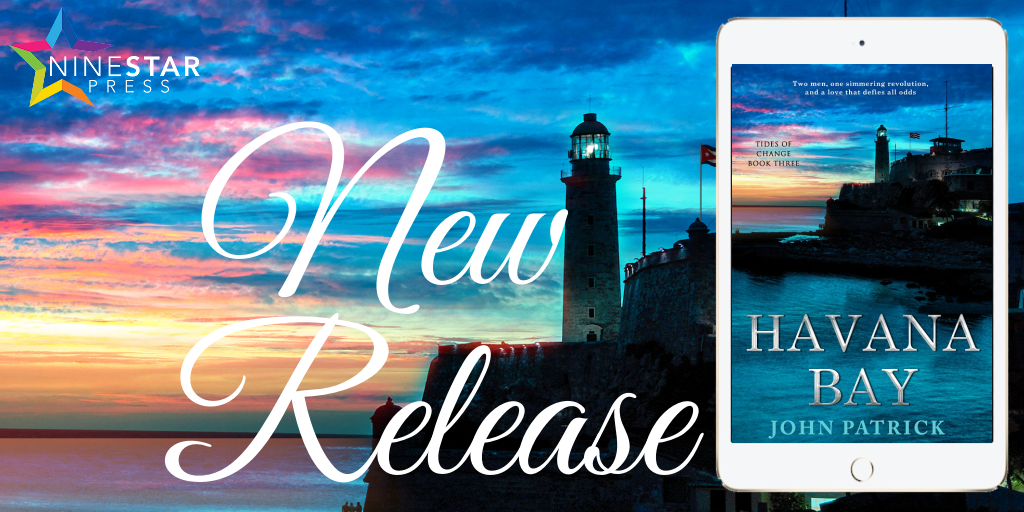#LGBTQIA+ #historical #booklover #bookblogger #bookaddict #romancereadersofinstagram #booknerd #bookworm
Title: Havana Bay
Series: Tides of Chage #3
Author: John Patrick
Publisher: NineStar Press
Release Date: 06/07/2023
Heat Level: 2 - Fade to Black Sex
Pairing: Male/Male
Length: 115200
Genre: Historical, historical, Cuba, age gap, male models, prostitution, gender bending, interracial/intercultural, tobacco farming, cigar production, college students, humor, politics, sexual awakening, virgin, public sex
Add to Goodreads

Description"Cuba, 1952.
Twenty-year-old Ernesto Ruiz is determined to save his family's cigar business by exporting directly to the American market, but he'll need to learn about American customs and lifestyles first. That's why he takes a part-time job at an American guest house.
Hank Mannix, a beefcake magazine model, enjoys his carefree life in Havana, where new men come and go every week. But his immediate attraction to the new gardener is different. He’s drawn to the young man in a way he’s never experienced before.
A fateful encounter in the garden results in a misunderstanding that upends both their lives. As they begin to acknowledge the true depth of their feelings for each other, they must navigate through a city and country on the brink of revolution. Ernesto and Hank strive to secure their own happiness in a world where the future is uncertain, and their love is forbidden.
With vivid historical detail and memorable characters, Havana Bay is a captivating story of love and revolution in a time of change."
Explicit Content Havana BayJohn Patrick © 2023All Rights Reserved
March 1952
Ernesto paused in his work to watch the spectacle unfolding on the beach.
He leaned his rake against a palm tree and raised a hand to shield his eyes against the sun’s glare. Next to him, his cousin Ivan placed his pruning shears on top of a high stone wall and squatted to rest in its shade.
His father’s admonition echoed in his mind. “Never slouch or squat, Ernesto. Always stand tall; otherwise, you’ll look like a peasant.” And Ivan did look like a peasant, with his sweat-stained T-shirt and worn cotton pants, cut short at the knees.
Ernesto wore denim pants, but they were clean—more or less—and fit properly. His lime-colored button-down shirt highlighted his amber eyes, and his black hair was oiled and slicked back from his forehead accentuating its silkiness.
Ivan was several shades darker than Ernesto and had features pointing to an African ancestry. Ernesto leaned more toward the Spanish side of the island’s genetic mix. It wasn’t supposed to matter—not in modern postwar Cuba. Not in 1952.
But it did matter, of course.
Both of them were darker than los gamelos blancos—the white twins—as the workers at Casa de Ada called them. They were wrestling on the beach, wearing tight bathing trunks, even whiter than the twins themselves. A film crew circled them, rolling their cameras and calling out directions in English.
Ernesto knew English, but Ivan had never tried to learn. There was no need to translate, however; the action was self-explanatory. The twins grappled in an easy way, more for show than dominance. Their oiled torsos gleamed in the sharp morning light, and their hands moved quickly, gripping a bicep, cupping the back of a head, sliding down a flank.
They weren’t really twins. In the few months Ernesto had worked at Casa de Ada, he’d learned to distinguish between its two most famous residents. The one who sometimes looked at Ernesto—looked him right in the eye—was slimmer than the more muscled one and not as hairy. He was beautiful, and when he did catch Ernesto’s eye and offered a knowing wink, it was terrifying.
He didn’t see him every day. Ernesto only worked a few hours in the mornings, cleaning up the gardens before most of the guests were up and about. But the twins were sometimes out early—when the light was best for photographs and filming.
They sank to their knees, and a wave washed over them, soaking their trunks, rendering them nearly transparent. Ernesto steeled himself against reacting.
Below him, Ivan snorted. “Locos,” he said and laughed as if he were watching a comic before a movie show.
Ivan was right; they were all such curious creatures, these Americanos who passed through Casa de Ada—the young, handsome ones as well as the older, rich ones. Who could say why they did what they did? Why they lay in the sun for hours even though their pale skin blistered and peeled. Why they drank so much, even in the mornings. Why they acted like girls sometimes and called each other “dear” and “darling.”
On the beach, the director called out instructions. “Mannix, flip Cordero over and get on top.”
Mannix. That was his name, the one who saw him.
The men switched places and Mannix pinned Cordero. He was looking up, away from his opponent and the cameras, across the beach and into the gardens. He caught Ernesto’s eye, and they locked gazes. Mannix offered a cocky grin and raised an eyebrow.
“Good,” said the director. “Good. Nice. Now push up into him, Cordero.”
Ivan turned to Ernesto. “What is he saying?” he asked.
“Nothing. Just giving directions,” Ernesto responded. “We should get back to work.”
“Sure.” His cousin stood and wiped his hands against his pants. “This is our chance though. What I told you about. Look at them.” With a nod of his head, Ivan indicated the mostly older white men—guests at Casa de Ada—who had gathered around to watch the show. They were transfixed by the white twins.
“That’s a wrap,” the director called. Mannix reached a hand down to help Cordero up. A soft smattering of applause rippled through the onlookers.
“Remember what I told you,” Ivan instructed. “Don’t make eye contact, but be certain they see you. Take one of the secluded paths into the deep parts of the garden. One will follow you.”
Ernesto wasn’t convinced he wanted to do that. Sure, it was easy for Ivan; he always talked of girls and all the sex he claimed to have had. He would view whatever happened at the end of a garden path, hidden behind a hedge, as purely transactional.
It was different for Ernesto. He couldn’t quite picture what Ivan had described went on in the thickets, and when he tried, it was all too close to what he thought he might enjoy anyway if the right boy were to come along. He thought about Mannix’s eyes, and his knowing smile.
“It doesn’t mean anything, Ernesto,” Ivan assured him, as if he were reading his mind. “It doesn’t make you a maricón. It only makes you a Yankee dollar richer. And you just have to stand there; the Americans do all the work. You don’t even have to look at them. You can close your eyes and think of a girl.”
Ivan reached up to retrieve the shears from atop the wall, and Ernesto took a step back. Ivan smelled ripe—a stronger odor than a morning’s work would account for. It was as if he hadn’t washed with soap and water in days. Ivan had come to stay with Ernesto’s family in the city, and failing to wash properly wasn’t the only bad habit he’d brought with him from his family’s rural tobacco farm.
It was absurd to think someone, even a loco Americano, would pay money to…do things…to Ivan. Ernesto wanted no part of it.
Still, a dollar…and maybe many more dollars if he didn’t find it too objectionable.
And he needed the money. That was without a doubt. If he did get into university—this time—there would be textbooks to buy, new shoes, supplies of all sorts, not to mention tuition. Ernesto’s father insisted they’d find a way to pay, but it was difficult to see how.
NineStar Press | Books2Read
Author John Patrick is a Lambda Literary Award finalist living in the Berkshire Hills of Massachusetts, where he is supported in his writing by his husband and their terrier, who is convinced he could do battle with the bears that come through the woods on occasion (the terrier, that is, not the husband). An introvert, John can often be found doing introverted things like reading or writing, cooking, and thinking deep, contemplative thoughts (his husband might call this napping). He loves to spend time in nature—“forest bathing” is the Japanese term for it—feeling connected with the universe. But he also loathes heat and humidity, bugs of any sort, and unsteady footing in the form of rocks, mud, tree roots, snow, or ice. So his love of nature is tempered—he’s complicated that way.John and his husband enjoy traveling and have visited over a dozen countries, meeting new people, exploring new cultures, and—most importantly—discovering new foods.



No comments:
Post a Comment